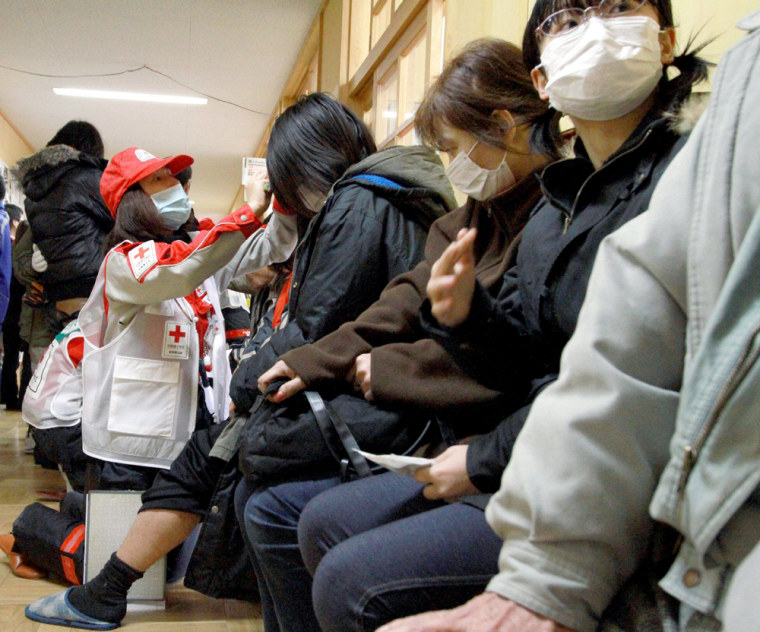Last year, when an earthquake struck Haiti, companies and charities rushed to aid the country, one of the world's poorest.
The initial response has been more muted for Japan as that much wealthier nation deals with a devastating earthquake and tsunami that has left 4,000 dead so far and at least 7,000 missing, not to mention an ongoing nuclear crisis.
So far at least, overall giving to aid relief efforts in Japan has been lower than in other recent disasters. According to The Chronicle of Philanthropy, charities raised more than $47 million in the first four days after the disaster struck in Japan. By contrast, four days after the earthquake struck in Haiti last year, more than $150 million had been raised.
The difference may have a lot to do with perceptions of Japan's wealth and preparedness to handle a major disaster, versus the resources available to an underdeveloped country such as Haiti, experts say.
In Japan, some big U.S. businesses may be feeling more compelled to donate to relief efforts because they have large customers or other business interests there.
“You have companies who have operations in Japan, who have personnel in Japan,” said Katherina Rosqueta, the executive director for the Center for High Impact Philanthropy at the University of Pennsylvania.
But others have held back on giving — at least initially — because they didn't initially think they were needed.
“There’s a great government in place — a big, strong government that’s dealing with it,” said Anup Malani, a professor at the University of Chicago Law School who has studied corporate philanthropy.
Some organizations also aren’t asking for money. Nicole Wallace, a senior writer for The Chronicle of Philanthropy, said 14 relief organizations her publication spoke with were not actively raising funds, either because they focus only on developing countries or because they were holding off to see if they were needed.
The Chamber of Commerce said Wednesday that businesses had donated $137 million in cash or in-kind donations so far. That tally is likely higher than the total cash donations relief organizations have received so far in large part because it includes non-cash contributions such as food, shoes or even software.
Giving efforts vary
Just one day after the earthquake in Haiti last January, retailing giant Wal-Mart announced a $500,000 cash donation and said it was sending prepackaged food kits valued at $100,000. In total, the company and its foundations have given more than $1 million toward Haiti relief efforts.
In Japan, where Wal-Mart operates 414 stores, the company’s initial response focused more on supplies than cash, as the company worked with government and relief organizations to provide food, water and other supplies to needy people there. Then on Wednesday, it said it would make $5 million in cash and in-kind donations, including 95 tons of water and emergency supplies such as tents, portable toilets, clothes and blankets.
It’s not surprising that a company with local operations would try to take advantage of that infrastructure to help out in a crisis, Rosqueta said.
“They may be able to bring local knowledge, local language skills and deploy resources in a way that you can’t if you’re (not) in a country,” she said.
Other companies also have focused on how they can use their own resources to help people in the country — to mixed results.
Soon after the disaster struck, search engine giant Google launched a Person Finder application that helps connect people who are looking for each other. The company, which also made a $250,000 donation, has drawn kudos for the effort.
Bing, the search engine operation run by tech rival Microsoft, launched an appeal on Twitter in which it pledged to donate $1 for each time someone retweeted a semi-promotional callout. According to The Seattle Times, the company quickly backtracked and pledged to donate $100,000 after some criticized Bing for appearing to use the earthquake as a marketing opportunity.
In total, Microsoft said it was pledging about $2 million toward relief efforts, including $250,000 in cash and the rest in in-kind contributions such as software.
The software giant donated $1.25 million in cash and in-kind donations following the Haiti disaster.
(Msnbc.com is a joint venture of Microsoft and NBC.)
Boeing Co., whose key customers include Japanese airlines such as All-Nippon, announced Tuesday that the company and its employees would make a $2 million donation toward recovery efforts in Japan. Boeing also has 200 employees and some key business partners in that country.
About two weeks after the earthquake struck in Haiti, Boeing announced that employees had donated about $910,000 toward relief efforts, and that the company would match any employee gifts up to $1 million.
Starbucks, which has been operating coffee shops in Japan for 15 years, said this week it would donate $1.2 million toward relief efforts.
When the Haiti earthquake struck, the coffee company's foundation donated $1 million toward relief efforts and accepted donations on behalf of the Red Cross at its stores.
Not surprisingly, Japanese companies have been quick and generous in their response to the disaster.
Japanese carmaker Toyota has donated $3.75 million toward relief and recovery in its home country. The carmaker donated $500,000 to the relief effort in Haiti. Video game companies also have given generously.
If a company does decide to donate, Rosqueta said they should look closely at how they can donate in an effective way that actually helps with the efforts, rather than just serving the company’s needs.
"The first question is not, as a company, what can I donate?” she said.
Instead, she said, corporations should be asking, “What are the needs on the ground? Once you understand that, then the question is, ‘Is there a way that I can address those needs?’”
